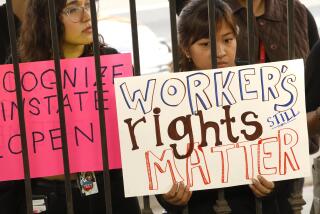Compounding a Crisis
- Share via
The Reagan Administration has decided to support congressional moves to tighten tax laws on the money made by nonprofit organizations in enterprises that they conduct to make money. We think that it’s a bad idea. It would only compound the crisis created by previous Administration efforts to squeeze the public funding of health, education and cultural institutions.
In this case revenue is said to be secondary to the fairness issue. Small businesses complain that they are affected by the competition of museum gift shops, hospital florists and university travel programs. But the figures that they present suggest that the effect of the money-making operations of nonprofit organizations is small by comparison with the importance of the supplementary revenue generated for worthy operations.
Take the Metropolitan Museum of Art in New York City, for example. Its book and gift store and its mail-order business raise enough money to fund close to half the great museum’s operating deficit. Present law, now 20 years old, leaves some ambiguities. That is inevitable. The charitable institution that owns a macaroni factory clearly pays tax on its unrelated business operation. Less clear are the limits on an organization like the American Assn. of Retired Persons to sell its members discount drugs, tours and insurance. We feel more comfortable about the ambiguities, and the ability of the Internal Revenue Service to sort out abuses, than we would with rigid rules that would put appropriate fund-raising operations at risk.
The oversight subcommittee of the House Ways and Means Committee has been conducting extensive hearings, and soon will make some recommendations to the full committee. The most useful proposal is for the IRS to require more detailed reporting on unrelated business income so that a precise judgment can be made in the future as to the necessity for new regulations.
More to Read
Sign up for Essential California
The most important California stories and recommendations in your inbox every morning.
You may occasionally receive promotional content from the Los Angeles Times.










